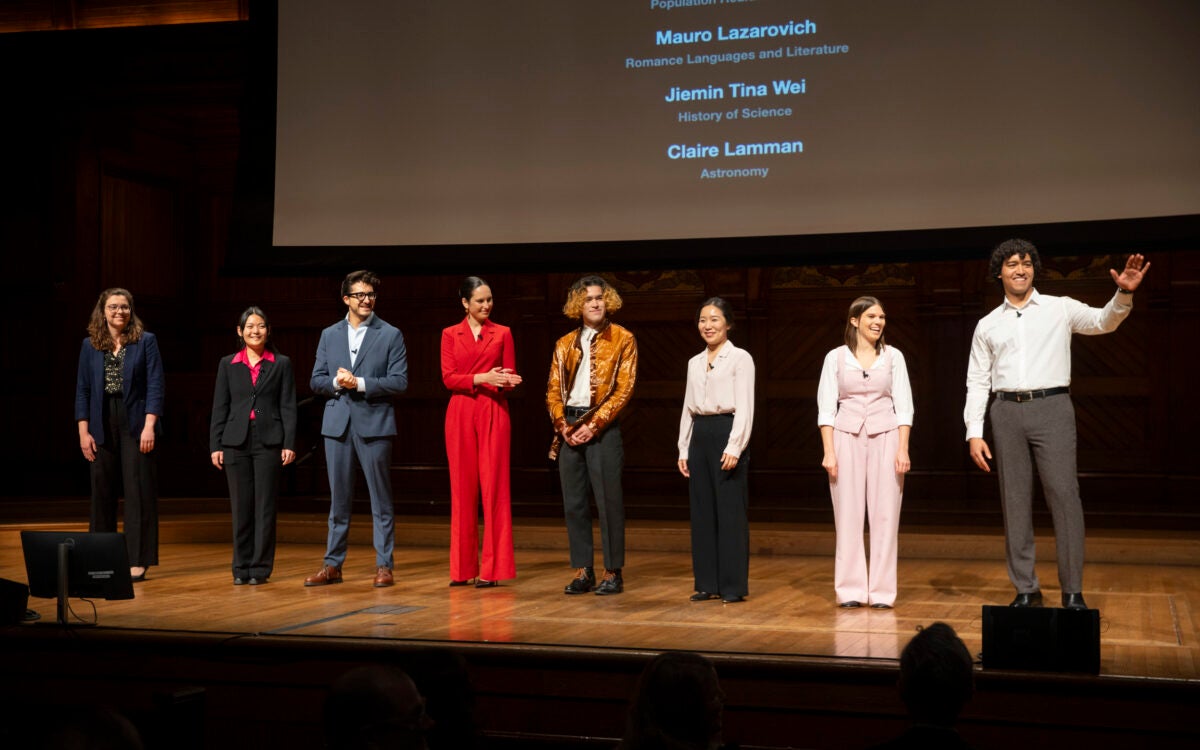Cambridge, Harvard, and MIT sign compact
Cooperative spirit is foundation for building sustainable future
Flooding caused by extreme weather events and rising sea levels has brought the impacts of climate change into stark relief, especially for low-lying neighborhoods along the Charles River and Boston Harbor.
In the past year, Harvard researchers have also shown that record warmth is leading to earlier flowering in springtime and that we can expect natural variations in sea level rise across the world as ice sheets melt. Governments, businesses, and higher education institutions are increasingly working together to address these challenges, finding that a collective response is more powerful than an individual one.
With this cooperative spirit in mind, the city of Cambridge, Harvard University, and the Massachusetts Institute of Technology (MIT) today signed the “Community Compact for a Sustainable Future,” aimed at leveraging the intellectual and entrepreneurial capacity of the public-private sectors in Cambridge to build a healthy, livable, and sustainable future.
“Climate change is a crisis that requires a comprehensive and collaborative response,” said Cambridge Mayor Henrietta Davis, who worked for more than a year with Harvard, MIT, and city officials to draft the compact. “Cambridge is uniquely positioned to serve as a leader in this response: We have unmatched intellectual capital and a culture of innovation and commitment to the environment.”
Davis was joined by City Manager Robert Healy, MIT President L. Rafael Reif, and Harvard President Drew Faust in signing the compact. The signing ceremony was held in MIT’s Barton Auditorium prior to an urban design symposium hosted by MIT Professor Christoph Reinhart.
Reinhart, a former Harvard Graduate School of Design professor, recently launched an online map showing electricity yields and associated costs for installing solar panels on Cambridge rooftops. Reinhart’s project and the symposium were highlighted as examples of the benefits that come from the sort of collaboration between universities, government, and businesses that the compact seeks to encourage. “We are here because we believe in a transition to more sustainable urban living worldwide,” said Reinhart.
The compact lays out a clear framework for how Harvard, MIT, and Cambridge, along with other partners, will collectively improve the health and well-being of the Cambridge community by addressing nine key areas of collaboration, including energy efficiency, renewable energy, climate mitigation and adaptation, storm water management, and green tech incubation. A steering committee will oversee the activities of the Community Compact and create a forum to provide an annual report to the community. The groups will also develop a shared process for collecting data to evaluate progress.
“Harvard is honored to be among the first signatories of the Community Compact,” said Faust. “We have much to gain from continuing to work together to confront climate change, and I hope other leaders across the city are inspired to join us — and our partners in the private sector — in creating a healthier and more sustainable Cambridge.”
Through the effort, Cambridge, Harvard, and MIT will work to develop and share new and innovative strategies, technologies, services, products, and best practices that can be used as replicable models for others, considering cost-effective solutions. Additionally, the members of the compact pledge to explore opportunities to connect researchers with community needs and initiatives, and to better connect students with local entrepreneurs and social enterprises.
“Cambridge has helped to pioneer the idea of urban environmentalism. Building on that commitment, and drawing on the scientific, technological, and policy expertise of MIT and Harvard, together we can make a difference for our local community and perhaps extract lessons with global value as well,” said Reif.
To broaden the reach of the compact, Davis announced that the signatories have already recruited the participation of an initial group of major business partners, including Akamai Technologies, Novartis Institutes for BioMedical Research, and Whole Foods.
“We believe energy efficiency and the management of greenhouse gas emissions are not only critical in information technology, but in all fields,” said Tom Leighton, CEO of Akamai. “We applaud the mission of the ‘Cambridge Community Compact for a Sustainable Future,’ and hope others in our business community will join with this important initiative.”
Harvard and MIT have a long history of partnering with the city of Cambridge to address environmental issues by serving on local committees; sharing best practices; improving operational efficiencies of topics such as green building, energy use, and waste reduction; supporting the expansion of the Hubway regional bike-share program; creating green spaces and community gardens; hosting farmers markets; and donating food and materials to local nonprofit organizations. By establishing the compact as a living document, the signatories hope to build on that history by continually improving their approach to collaboration and problem-solving.




